Peter MALONE
Saturday, 18 September 2021 19:48
Sniper: Reloaded
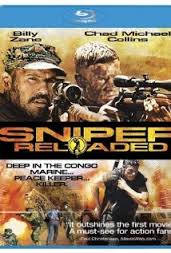
SNIPER: RELOADED
South Africa, 2011, 91 minutes, Colour.
Chad Michael Collins, Billy Zane.
Directed by Claudio Fah.
The Sniper series was popular at the box office. The first film was released in the early 1990s and starred Tom Berenger. Now we are with the next generation, Berenger’s son, played by Chad Michael Collins.
While the action begins in the United States, it transfers to Southern Africa, taking advantage of local colour, animals, clashes amongst the tribes, espionage, and white criminals, snipers.
Billy Zane portrays the military instructor, a friend of Tom Berenger. When there are difficulties in Africa, he turns up, helps the hero, and there was all and they resolve all the situations as might be expected.
Straight to DVD release, popular and undemanding entertainment.
1. The previous Sniper films? Continuity? Personalities? Now, the son of the hero? A franchise?
2. The rebooting of the plot, of the characters, the change of venue, South Africa?
3. Some of the history, Beckett, his work, achievement?
4. The son of Beckett, his own expectations, memories of his father, meeting his father’s friends, in his footsteps?
5. The South African locations, the parks, the range of animals and their life? Musical score?
6. South Africa, the connection with the Congo, the story, the rebels, wars, arms deals, the United Nations? American interventions? Secret missions?
7. The opening, the interrogation, the Marines, the United Nations representatives, the local officials, the rebels? The flashbacks indicating themes of the story?
8. Beckett, the officer commissioning him, the team? Africans and Americans? Flying in, the plantation, the owner, their wanting him to leave, his being unwilling? The shots, people fleeing, the role of the sniper, the later revelation of his being American? The deaths? Bekett’s friend and the discussions, and
the hole? Beckett’s surviving?
9. The meeting with Chandler, the hunters, the children in his care, Chandler accompanying Beckett back into the house, the encounter with the daughter, the role of the rebels?
10. The kid, being wounded, hospital? Meeting Abrahamowitz, the men betting about his approach to her, her putting him down, the meetings, the talk, the stories, the sexual relationship, her help?
11. Miller, Billy Zane, Beckett’s friend, in the US, training the snipers, going to Africa, discussions with Beckett, the test and failure, following him into the village, the rescue?
12. The mission, in the village, the information, the American sniper?
13. Rescuing Abramowitz, the deaths, Miller and his intervening?
14. The authorities, the hearing, the decisions?
15. The sniper, his attack, cat and mouse with Beckett, using the light, the kid tricking him, the sniper’s death?
16. The revelation of the traitor, the local authority, motives, arms-dealings, playing both sides of the politics? The discussions, his being taped, arrested?
17. Another sniper film…?
Published in Movie Reviews
Published in
Movie Reviews
Tagged under
Saturday, 18 September 2021 19:48
Fools Rush In
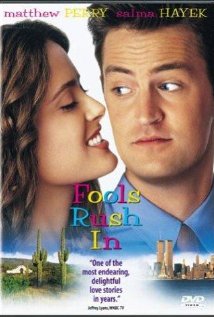
FOOLS RUSH IN
US, 1997,109 minutes, Colour.
Matthew Perry, Salma Hayek, Jon Tenney, Jill Clayburgh, Tomas Milian.
Directed by Andy Tennant.
Fools rush in… Where angels fear to tread. Well, not quite.
This is a very light comedy capitalising on the popularity of Salma Hayek 1990s as well as the popularity of Matthew Perry on Friends. He plays a businessman who has a one night stand in Las Vegas. Salma Hayek portrays the young woman who then finds that she is pregnant and wants to track down the father. Which she does.
There is some comedy in the contrast between the rather straight WASP culture, embodied by Perry. And the huge family culture of the Hispanics in the United States. Of course, there are crises, but love wins out at the end.
The film was directed by Andy Tennant who directed such films as Anna and the King, Hitch, Sweet Home, Alabama.
1. The title? Expectations? Romantic comedy, nineties style? The Hispanic aspect?
2. Las Vegas, homes, the nightclubs, the hotels, the desert? Nevada and the canyons? The Hoover dam? Mexico, landscapes, the village? New York City? The musical score, the songs?
3. The popularity of the stars in the 1990s?
4. Alex, from New York, his job in Las Vegas, building, the casino, his friendships, john, his situation in Las Vegas?
5. Isabelle, her family, large, interactions with them, her job?
6. The encounter, the mix-up, talk, the sexual night, her leaving early morning? No address?
7. Alex, continuing his life, her return, the news, Alex going out but staying with Isabelle, his reaction, the issue of the abortion and his expectations, a
decision to keep the child, the effect on him, his being touched? The Hoover dam?
8. The visit to Isabelle’s family, the tough father, authoritarian and the mother, her religiosity, the brothers and being tough, the fiancé and the past relationship, everybody shouting, the food, the impact on Alex?
9. Alex, his life, its meaning, the decision to marry, the honeymoon at the hotel, going to work, the visit from Isabelle’s father, his anger?
10. The collage of their life, happy scenes, the redecoration of the house?
11. Isabelle and her friend, discussions, the dinner and Katie overhearing?
12. The work on the club, Isabelle invited, the dates?
13. The job, the failures, success, the boss and his invitation for Alex to go to New York? The New York issue between Alex and Isabelle, her life and friends and family in Nevada it? His not telling her the plan? Her discovery?
14. His parents, arrival, the comic touch, thinking Isabelle was the maid and their reactions accordingly, the mother drinking? The meeting of the two fathers on the boat? Racial issues? Tension?
15. Alex and Isabelle and the fight, her going to hospital, saying she had lost the baby, the divorce papers?
16. Alex, the return to New York, his successful work, the issue of signs and Isabelle believing in them, changing her mind? Alex not believe in signs, the priest and his word on the street, the Hispanic child and the other signs?
17. The family, the mother church, the candles? The brothers and their taking Alex shooting, the snake, their firing, his falling in the cactus?
18. His decision to go to visit Isabelle’s grandmother, Isabelle’s description, the grandmother welcoming him, the return, going to Hoover Dam, the rain, the meeting, giving birth? The effect on each of them?
19. And happy ever after?
Published in Movie Reviews
Published in
Movie Reviews
Tagged under
Saturday, 18 September 2021 19:48
Mortal Instruments: City of Bones, The
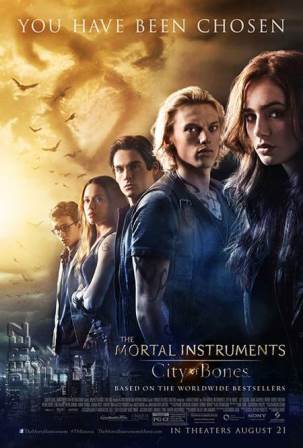
THE MORTAL INSTRUMENTS: CITY OF BONES
US, 2013, 130 minutes, Colour.
Lily Collins, Jamie Campbell Bower, Lena Headey, Jonathan Rhys Myers, CCH Pounder, Kevin Zegers, Jared Harris.
Directed by Harald Zwart.
Teen fantasy. That’s the phrase we’re looking for. The Mortal Instruments series is new teen fantasy. After the success of the Harry Potter films, with the introduction of the Twilight series, with the continued popularity of The Hunger Games (and more novels and films in the offing), there seems to be a hearty appetite amongst teenage audiences for this kind of fantasy. While it will appeal to teenagers, it may not appeal so much to their parents.
The Mortal Instrument series has been written by Cassandra Clare. Once again it is a female author who has been able to come up with this imaginative world. However, it is not very clear to those who have not read the books what the mortal instruments actually are and how they function. We are taken to a mysterious institute with a burial place for demon-hunters which is called the City of Bones. But not much more explanation of these themes, though lots of explanation of the background of the characters.
Taking a glance at some comments from the readers of the book, we find that the general impression is that the film is a good adaptation and a number of fan-readers recommending it.
So, what is this particular fantasy about? Somewhat disconcertingly for those not in the know, it opens in contemporary New York City, not a fantasy world. It looks as though it is going to be a domestic story. We have a concerned mother, a teenage daughter with the touch of rebellion, and geeky kind of boyfriend, and a poetry reading from a pretentious young poet, a visit to a nightclub.
But, somehow, behind the surface of New York, there is a parallel world. Perhaps not quite so much parallel world. Rather, an alternate world, because, if you have the gift, you can see the alternate characters and interact with them. And, of course, there is deep evil in this alternate world.
The story is all about demon-hunters. The mother, it transpires, was one of the greatest but she is pursued by the demons themselves, wanting to protect her daughter, who we soon learn has the powers, and pretty potent powers at that. Enter a gallant young man, Jace, the hero demon-hunter for the film (Jamie Campbell Bower). He has a group of friends who fight with him. After rescuing our heroine, and Clary is her name, Lily Collins, he takes her to a vast supernatural institute which is masked from ordinary view but, again, is right there in New York City.
We have met the demons. We have met the demon-hunters. We find a sage older man in the institute (Jared Harris), who is able to reveal some of the secrets. In the meantime, at the rather suburban-looking home of Clary, there is a mysterious woman downstairs (CCH pounder) who has tarot card powers.
The quest is to find a mysterious cup, which will help the demon race survive, when Valentine (Jonathan Rhys Meyers), has it in his power.
The film is longish, immersing us in this double world, puzzling about what the outcome ultimately will be, or how it will be worked out. And then the film pauses… because the sequel is in preparation!
1. A popular entertainment? Critical savaging?
2. The title, the humour of the police department from the afterlife?
3. Tone, plot, characters, action, the blend of thriller comedy?
4. Earth, ordinary life, the police, cases, action? The contrast with the afterlife? Officers, characters and tasks? The decor and costumes of the afterlife?
5. The special effects, action, the characters? The musical score?
6. The situation with the gold, honesty and dishonesty, the raid, Bobby and Nick, Nick being shot?
7. Nick, going to the afterlife, the frozen world and his walking through it? Meeting Proctor, allotting of tasks, his being assigned to Roy?
8. The avatars, the elderly Chinese for Nick, the glamorous blonde for Roy? The effect in seeing them, people encountering them?
9. Roy, from the 19th century, the cowboy, Jeff Bridges and his the bosky style, Send? Is personality, his quotes? Nonchalance? Nick, the tensions? Their driving and arguing? There avatars? Proctor supervising?
10. The Staff of Jericho, the gold, Bobby and his police work, actually dead soul? Real life as his cover? Is planning to get the dead souls? The nickname of Deadies?
11. The quest for the gold, the variety of dead souls and the attacks, the fights, in the streets, the buildings? The souls and their assembling? Nick and Roy and the confrontation with Bobby?
12. Good versus evil, the world being saved?
Published in Movie Reviews
Published in
Movie Reviews
Tagged under
Saturday, 18 September 2021 19:48
RIPD
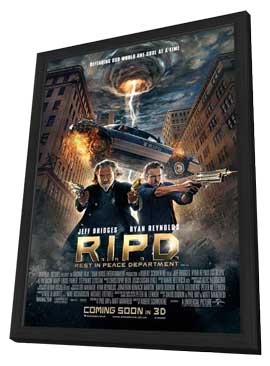
RIPD
US, 2013, 96 minutes, Colour.
Jeff Bridges, Ryan Reynolds, Mary Louise Parker, Kevin Bacon.
Directed by Robert Schwenke.
What film would have its leading man shot to death within the first ten minutes? Well, RIPD. But this is not to spoil a plot, because right from the beginning we learn that the hero is dead. Then we get an instant flashback to the situation where he dies. While the film is about action on earth, the plot also takes us into a very bureaucratic version of the afterlife, at least in the police department, RIPD, the Rest in Peace Department.
Nick Walker (Ryan Reynolds) dies and time stands still, action is frozen. He finds himself in a tornado-like whirlwind and sucked up into the skies and suddenly sitting at a desk opposite Miss Proctor who is the administrator for the RIPD. She does a quick explanation, which is helpful for the audience, and informs us all that the squad is to go back to earth and bring ‘deados’ - evil types who have died but have remained hidden on earth - back to the office or eliminate them. So far, so odd.
While Nick is ordered to go back to earth, he is also given a partner. This turns out to be Jeff Bridges, looking like Buffalo Bill or Wild Bill Hickock or some other characters from the 19th century west, which is, in fact, when he came from when he arrived at the RIPD. Bridges must have enjoyed his role as Rooster Cogburn in the remake of True Grit and he does quite a similar role here, boisterous, loud and strident at times, with a touch of humor.
By this stage, or earlier, most movie fans will be thinking that this is Men in Black RIPD-off. This time the men are not in black. In fact, on earth they have different appearances so that they are unable to communicate with their loved ones. Nick looks like an old Chinese gentleman. Roy is a more than glamorous young woman. The audience principally sees the two agents as they are, with some humorous moments when we see how the characters are perceiving them in their disguise, with appropriate and inappropriate responses.
Nick had a loving wife, Julia, but deceived her by burying some gold that had fallen into his and his partner’s hands. The partner is played slimily (literally at the end) by Kevin Bacon. We see him shoot Nick, play the sympathetic friend before he reveals his true self.
In between pursuing ‘deados’ with all kinds of special effects, climbing buildings, car chases, and exploding monstrous ‘deados’, as well as returns to Miss Proctor and her reprimands, they uncover a plot to gather together gold pieces to make and ancient column of gold which, when completed, would return all the dead back to earth where they could live forever.
Needless to say, this is not an entirely plausible plot! It is based on a comic novel and so feels free to do what it likes with life and death, police work from the afterlife, and mayhem in downtown Boston…
While the leads do their best, they don’t have such screen presence as Will Smith and Tommy Lee Jones, so there may not be RIPD 2. However, as an amusing pastime, it will entertain an undemanding audience.
1. A popular entertainment? Critical savaging?
2. The title, the humour of the police department from the afterlife?
3. Tone, plot, characters, action, the blend of thriller comedy?
4. Earth, ordinary life, the police, cases, action? The contrast with the afterlife? Officers, characters and tasks? The decor and costumes of the afterlife?
5. The special effects, action, the characters? The musical score?
6. The situation with the gold, honesty and dishonesty, the raid, Bobby and Nick, Nick being shot?
7. Nick, going to the afterlife, the frozen world and his walking through it? Meeting Proctor, allotting of tasks, his being assigned to Roy?
8. The avatars, the elderly Chinese for Nick, the glamorous blonde for Roy? The effect in seeing them, people encountering them?
9. Roy, from the 19th century, the cowboy, Jeff Bridges and his the bosky style, Send? Is personality, his quotes? Nonchalance? Nick, the tensions? Their driving and arguing? There avatars? Proctor supervising?
10. The Staff of Jericho, the gold, Bobby and his police work, actually dead soul? Real life as his cover? Is planning to get the dead souls? The nickname of Deadies?
11. The quest for the gold, the variety of dead souls and the attacks, the fights, in the streets, the buildings? The souls and their assembling? Nick and Roy and the confrontation with Bobby?
12. Good versus evil, the world being saved?
Published in Movie Reviews
Published in
Movie Reviews
Tagged under
Saturday, 18 September 2021 19:48
Lawless
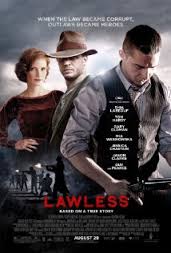
LAWLESS
US, 2012, 115 minutes, Colour.
Shia La Boeuf, Tom Hardy, Jason Clarke, Jessica Chastain, Guy Pearce, Gary Oldman, Mia Wasikowska,
Directed by John Hillcoat.
The original title, from the book by one of the descendants of the three brothers, Bondurant, was ‘The Wettest Country in the World’, a story about Prohibition days and moonshine smuggling. However, after watching the film, Lawless does seem a much more appropriate title.
While there have been films about moonshine in the 1920s and 1930s, the emphasis on the city gangsters or the outlaws who drove around the US robbing banks has been a bigger staple of crime thrillers about the period. However, while there is reference to Al Capone, this is a story of the Virginia mountains and a family (based on a true story) that brewed, delivered and sold around the county (with a wink from some of the police).
We are introduced to the Bondurant brothers as boys, with Jack, the youngest, unable to shoot a pig on the farm. The oldest boy, Howard, drinks a lot but is under the sway of the middle brother, Forest, who had harsh experiences fighting in World War I. The action of the film takes place in 1930 and stays in the small town, in the brothers’ home, on the roads and local bridges and at the still. Chicago takes an interest and some gangsters come down to throw their weight around but to buy from the brothers.
But, the law is interested. The law is embodied by one of the most detestable agents we have seen on screen, in demonically ruthless and relentless pursuit of the brothers. He is a fashion dandy with perfume, bow tie and suit, polished black hair, parted in the middle – and no eyebrows. He can beat people brutally. He resents any implications when he is referred to as a nance. He orders attacks on stills but has little personal loyalty from the police and his deputies. In many ways he steals the show in Guy Pearce’s near or over the top performance.
While Shia La Boeuf has the main role as Jack, somewhat timid, brutally beaten, wanting to be a someone in the business, meanwhile attracted to the daughter of a pastor in charge of a closed and traditional community, it is Tom Hardy as Forest who is more interesting. Hardy has proven himself in the last five years to be a versatile actor (and handy with American accents). He is quiet but what one might call indomitable, especially when slashed, beaten and shot so often. Jason Clarke is Howard.
There are only two main women in the film, Jessica Chastain as a dancer who has fled from Chicago, and Mia Wasikowska as the pastor’s daughter. They have limited screen time but do establish their characters strongly. Gary Oldman has some scenes as the gangster from Chicago.
Filmed in Georgia, the film looks good. The cast is solid. The screenplay, by Nick Cave (who also wrote the score, as he did with John Hillcoat’s The Proposition) is stronger on characters than offering a complex plot.
The Bondurant brothers were not exactly lawless. They lived outside the law. Their vicious pursuer is much more lawless, exploiting the law on his side. There is a quiet epilogue which reminds us that Prohibition was repealed and so many of the bootleggers settled down to respectability by the time that World War II broke out, another era.
1. A piece of Americana? Prohibition and its aftermath? The true story? The photo of the brothers at the end? (The Australian contribution to the film, director, writer, cast members?)
2. The 1930s, the mountains and hills, the terrain, the distilleries, the town, streets, homes, the cafe and accommodation? The feel of the period? Costumes and decor? The musical score?
3. Jack and the voice-over, his perspective, admiration for Forest, the acceptance of bootlegging, the way of life? His experience of violence?
4. The brothers, the introduction, their ages, attitudes, relationships with each other? Forest as the oldest, leadership? Howard in the middle, relying on Forest? Jack as the youngest? The stills, the deliveries, the cafe? The reality of Prohibition, their attitudes? Attitudes to of the law? Lawlessness?
5. The violence, the prohibition criminals? The Prohibition criminals? Floyd Banner, driving into town, the machine gun, shooting the car? Ruthlessness? The later encounter with Jack? Talking with him? Tasting the liquour? The deal, doing business? His henchmen, confronting Jack, taking him to Banner? And bashing him? Banner and the police and the powers that be?
6. Forest, silent, big, strength of character, driving the truck, the deliveries, the encounters with the police and his disregard? The arrival of Rakes? The confrontation? Maggie’s arrival, asking for the job, his acceptance? The men attacking him, slitting his throat, Maggie returning, taking him to hospital? His being saved? The brothers visiting him in hospital? His confronting and warning Jack?
7. Howard, the second brother, tough and rough, involved in all the action?
8. Jack, the focus, his age, inheriting the business and the attitudes? Cricket as his friend? Seeing Bertha, going to the church, his hat, the washing of the feet, running away, the pastor sending his shoe back? The confrontation with Rakes, the brutality of Rakes’ bashing him? Forest and his attitude? Jack and his friendship with Cricket, the inventions, the engine for the car and its speed? Encountering Floyd Banner? The deal? The dress for Bertha, changing into it, their love for each other? Rakes taking advantage of Jack, the pursuit, going into the stills, the violence, the destruction and explosions, Rakes following Cricket into the woods, killing him? Jack ultimately confronting Rakes, being shot, despite the wounds, pursuing Rakes and killing him?
9. The local police, the double standards, violence, their stances, ambiguous, against Rakes at the end?
10. Rakes, his appearance, hair and eyebrows? Deputy? The corrupt boss giving him orders? Rakes and his arrogance, attitude towards the law, doing his job? His address, his vanity? The brutality towards Jack? His defiance? Following Jack, the destruction of the stills, his killing Cricket? With the girl in his room, the mirror, his vanity? The final confrontation, the stands, shootings, his being wounded, fleeing across the bridge, the confrontation with Jack, his death?
11. The character of Cricket, having rickets when he was young, clever, designing the stills, running them, designing the engine, a simple young man, his death?
12. Bertha, religious, her father, playing at the dance, playing in the church, the washing of the feet, meeting Jack, the discussions, his buying the dress, her being in danger and Jack getting her to flee?
13. Maggie, coming from the city, going to Virginia, asking for the job, hearing Rakes, coming back, discovering Forest, taking him to the hospital? The sexual relationship? Her work, observing? Wanting to leave, staying?
14. The political background, the establishment of Prohibition, administration of the law, the role of the criminals and crime waves?
15. The final confrontation, shootings, Forest wounded (and recovering)?
16. The ending of Prohibition? The families, 1940, the boys or married, leading an ordinary life, jobs? Howard settling down and his wife and children? Maggie and Forest? Bertha and Jack and their children?
17. Urging Forest to dance, going out, on the ice, dancing, falling in, getting out, his past extraordinary survivals, dying of pneumonia?
18. A picture of life in the 30s – and the transition to the period of World War II in the 1940s?
Published in Movie Reviews
Published in
Movie Reviews
Tagged under
Saturday, 18 September 2021 19:48
War of the Buttons/ La Guerre des Boutons/ 2011
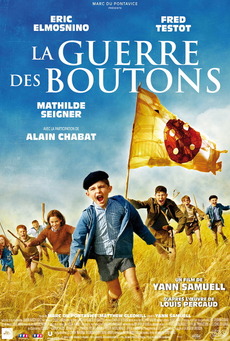
THE WAR OF THE BUTTONS
France, 2011, 100 minutes, Colour.
Eric Elmosnino, Mathilde Seigner, Alain Chabert, Vincent Bres, Salome Lemire.
Directed by Yann Samuell.
The War of the Buttons was a novel written in 1913 by Louis Pegaud. It was filmed in 1963 by Yves Robert and was considered something of a classic, bringing to life the children in the novel, waging war between two villages, an allegory for all wars – and for the war in Algeria which was being waged at the time of the films making. There was a version transferred to Ireland in 1994. It was also filmed in 2011, with the title The New War of the Buttons, with the setting at the end of World War II and a focus on a young Jewish woman.
This version, designed for children and a family audience, is also set during the Algerian war. There is very little reference to it except when an older boy comes back from Algeria, somewhat shellshocked from his experience in the war.
The film focuses in detail on the children, the initial clash with slingshots, the escalating hostilities, the number of fights and the means used.
On the other hand, the screenplay gives attention to education, the children at school, the work of the teacher who grew up in the area and has come back to teach. It also focuses on the leader, William Lebrac, who helps his widowed mother with the milking and distribution of the milk, who was respected by the children. The teacher recognises his ability and urges him to study and to sit for a scholarship for a better school.
The film also features the parish priest who plays soccer with the boys, referees the matches, takes the school photos, preaches at mass, intervenes with the boys. It is an interesting and quite sympathetic portrait of a priest at that time.
While the film is entertaining, it also highlights the futility of war, the presupposition that there should be conflict and rivalry and that this should continue in hostilities rather than reconciliation.
1. The classic novel, the number of remakes? Relevant in the 21st century?
2. The French setting, the early 1960s, the war in Algeria, the allusions to that war, the parallels between the war of the buttons and the serious war in the French colonies?
3. The village, school, homes, church, the countryside? The musical score? The children and the contemporary song and dance?
4. The opening, the gangs, the boys with their slingshots, going into action, the chases, the threats, the rivalries? The two towns, the gangs and the ages of the boys? The leadership?
5. The presentation of fights, melees?
6. The role of the teacher, his classes, the emphasis on grammar, language, matters? His past, from the town, the champion at stone skimming, his treatment of the children, his knowledge of what they were up to? His focus on Lebrac, hopes in him, threats, the boy giving the right answers, his encouraging him, discussions with his mother, persuading him to do the scholarship test? The rivalry with the teacher from the other town, their reconciliation through stone-skimming?
7. Lebruc, older than the others, leadership, working for his mother, the clashes with his mother? The discovery of the girl in the group? The attraction? Their meeting, the windows, the song and dance and throwing things out? The girl putting on her dress and rescuing him? The farewell as he went off to the new school?
8. The priest, playing with the boys, sport, referee, the mess with the school photo, at mass and the children running out for the party? Benign, intervening when necessary?
9. Lebruc’s mother, widow, hard work, wanting her son to get an apprenticeship, hearing the teacher, relenting about his scholarship?
10. Sitting for the scholarship, the teacher, his answers, support from the teacher, his success?
11. The build-up to the party, the elaborate preparations, the rival gang, the tractor, the boy who wanted recognition, the toffee apple the little girl and her response? The continuation of the party?
12. The allegorical meaning of the story with the rivalries and the battles?
Published in Movie Reviews
Published in
Movie Reviews
Tagged under
Saturday, 18 September 2021 19:48
Neverland
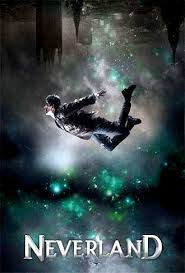
NEVERLAND
UK, 2011, 180 minutes, Colour.
Rhys Ifans, Anna Friel, Charlie Rowe, Keira Knightley, Bob Hoskins, Q’orianka Kilcher.
Directed by Nick Willing.
Neverland was designed as a television Mary’s miniseries, a telemovie. It is one of the many variations on the Peter Pan theme, from the novel and play by J. M. Barrie, to the Disney film of the 1950s, the Broadway musical with Mary Martin, Stephen Spielberg’s Hook and the film, Finding Neverland.
This film starts in the 17th century with pirates, Anna Friel as the captain of a rogue ship in the Atlantic. When they plunder a ship, they find a magic globe with Tinkerbell inside. They fear it is a demon, touch the globe and are transported into Neverland.
The scene then changes to London in 1906. Rhys Ifans is Jimmy, a disgraced gentlemen, living in the East End, with a group of boys around him who steal – reminiscent, of course, of Fagin. One of the boys is Peter, the son of a woman that Jimmy loved. Peter wants to prove himself and leads the boys to a robbery that Jimmy himself wanted to do to get back the globe and reinstate himself in society. In touching the globe he and the boys go into Neverland.
The pirates are there in Neverland as well as a group of Indians who have been transported. Jimmy teams up with the Pirate Captain; her assistant, Smee (Bob Hoskins) takes charge of the boys. Peter and another boy find themselves with the Indians. Ultimately, there is a clash between the pirates and the Indians, Peter trying to remain loyal to Jimmy but finding that he has been betrayed. He is rescued by Tinkerbell and learns how to fly. He also goes back to London and returns with gifts. The whole story is a preparation for the later stories of Peter Pan.
Charlie Rowe is very good as Peter Pan. Rhys Ifans combines charm and the sinister as Jimmy who is revealed as Hook. Anna Friel’s enjoys herself as the Pirate Captain and Keira Knightley is the voice of Tinkerbell.
1. The perennial popularity of Peter Pan stories? J. M. Barrie’s novel and play? The Disney version? Spielberg’s Hook? Broadway musical? Finding Neverland? This film in that tradition?
2. A new version, pre-Peter Pan? Speculation about his character and origins? The preparation for his future?
3. The initial fantasy, the 17th century, the pirates? The Indians? Neverland? The magic globe? Tinkerbell? The groups disappearing from Earth going to Neverland? Neverland and its look, the maps, the mountains, the valleys, the caves, ice floes, the special effects? The musical score?
4. Made for a television audience, the length? The plot and characters? Adventures? Drama? Peter Pan and the fantasy?
5. The pirates, the captain, the overtones of the Blackbeard stories? Piracy, the ships, the battles, taking the cargoes? The captain and the henchmen? Smee? The globe, Tinkerbell, thinking the globe was bewitched, touching it – and the disappearance?
6. The transition to 1906? Jimmy and the echoes of Fagin? The boys, the individuals, as a group, the stealing, the set up with the pickpocketing, the chase, Peter on the rooftops, playing his pipe and guiding the boys? the police, cuffing the boy, the boys bumping and releasing their friend?
7. Jimmy, his character, with the children, his relationship with Peter, Peter as the leader, the fights amongst the boys? Jimmy and his stealing, the special job? Jis background, resentment about being expelled from society? His ambitions and sense of revenge? Peter persuading the boys, their going to the shop, the robbery, Jimmy’s arrival, the clashes, finding the globe and the disappearance?
8. In Neverland, the lost boys, Peter and the boy on the ice floes? Watching the ship? The Indians?
9. The pirates, taking the boys, Smee controlling them?
10. The Indians, the elder, the chief, the story of the tribe, as a group, the daughter, Peter and his resistance, attempts to escape? Hiding under the boats and following the Indians?
11. Jimmy and the pirates, the attraction to Bonnie, sexual, his command, change of clothes? With the boys? The revelation that his name was Hook?
12. Peter, the daughter, her help, hiding under the boats, the Indians and their fishing? Going on to the ship, Jimmy and Bonnie, their discussions, Peter and his disillusionment? Helping the boys to escape, the boy going back, falling from the ship and dying? The boys and their living with the Indians?
13. Jimmy and Bonnie, searching for the globe, Smee and the boys? The henchmen and his pursuit?
14. Peter, the encounter with Tinkerbell, transforming him, flying, learning how to live in the new world? With the boys, the Indians? His return to London, coming back with gifts?
15. Jimmy’ story of love for Peter’s mother and hostility towards his father?
16. The boys, their characters, staying with the Indians?
17. The build-up to the clash between the pirates in the Indians? Peter believing Jimmy, Jimmy and his lying? The conflict? Peter and his being wounded, almost dead? Tinkerbell reviving him?
18. The ending of this story – but the preparation for the story of Peter Pan?
Published in Movie Reviews
Published in
Movie Reviews
Tagged under
Saturday, 18 September 2021 19:48
Vanilla Sky
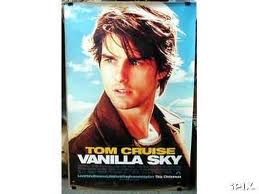
VANILLA SKY
US, 2013, 136 minutes, Colour.
Tom Cruise, Penelope Cruz, Cameron Diaz, Kurt Russell, Jason Lee, Timothy Spall, Noah Taylor, Tilda Swinton.
Directed by Cameron Crowe.
Vanilla Sky is the American version of the Spanish film, Abre los ojos, directed by Aleyandro Amanabar.
Tom Cruise portrays a wealthy young man, arrogant in business, womanising, fickle in his relationships. However, the narrative is not straightforward. Even in the opening, Cruise’s character, David, wakes up twice, looks at himself in the mirror, goes driving, first of all in empty streets. The audience is challenged, as is the character eventually, to try to work out what is real and what is unreal.
This is further complicated by his driving with his girlfriend, Cameron Diaz, and their crashing. His face is disfigured and he wears a mask. He is apprehended by the police, responsible for her death. He is also seeing a psychiatrist, played by Kurt Russell, to try to come to terms with what is real and what is not.
And there is a further complication with the presence of Sophia, Penelope Cruz reprising her role from the original film. At times, in his imagination, David interchanges the two women in his life.
There is also the big business theme and the meeting of the board, with Timothy Spall as its liaison with David. And there is his friend, played by Jason Lee, who feels betrayed by him.
The film also changes gear towards the end when the theme of cryogenics is introduced the possibility for the company to alter memories and to alter lives. Noah Taylor appears as the representative of the company and there is an interview with Tilda Swinton.
Cameron Crowe, who worked with Tom Cruise in Jerry Maguire, was a journalist for Rolling Stone (the theme of his film, Almost Famous). He has written the screenplay himself and incorporates a great deal of contemporary music.
A tantalising film.
1. The audience sharing the experience of David, his story, the characters in his lives, reality and unreality, fantasy, dreams, final challenge?
2. The original Spanish film? Transferred to the United States? the cast, the director?
3. The screenplay and its narrative, the broken time zones, interconnections, reality and unreality? Waking and re-awakening? Living where? Characters, identities changing? The accident, death? The police? Who was in the car? David disfigured, the mask? The psychologist and his work? Understanding the dreams?
4. The mysterious man in the bar, Edmund Ventura, revelation of the contract, the company, cryogenics, the layout and glamour of the offices? Rebecca Dearborn and the interview? Explanations, the visuals, changing lives, forgetting the past, a new life, immortality, the nature of the choices?
5. David, initially waking, looking at himself in the mirror, the effect, going out, no traffic? Waking up again? Julie present? Interactions with her? The ordinariness? Driving? Driving with Brian, sharing with him? The exhilaration of David’s life? His work? The Seven Dwarfs and the board meetings? Thomas Tipp and his advice? Decisions?
6. The party, Brian and Sophia, the attraction, his birthday, the cake, the celebration, his taking Sophia, their talking, the meanings of life? Julie arriving, stalking him, the reactions?
7. Julie, with David, the drive, the talk, dangerous driving, the crash and her death?
8. The police, David, the arrest, in the prison?
9. David, the surgery, the doctors and the committee?
10. David, his face, wearing the mask? The psychiatrist? The warnings by Tipp?
11. Julie and Sophia, mixing identities and appearances, claiming to be Sophia, the effect?
12. The discussions with the psychiatrist, his help, the time limits, the situation with the police, prison? His saying he would support him always?
13. The bar, Edmund Ventura, going to the firm, the explanations? David listening to the explanations, his life, the choices, the psychiatrist urging him that he was real, yet not knowing the names of his children…?
14. David, the roof, his fear of heights, the dive?
15. Reliving his life, and its meaning?
16. The reference to Monet, the vanilla sky? Reality and unreality, bending reality, the range of songs and the score.
Published in Movie Reviews
Published in
Movie Reviews
Tagged under
Saturday, 18 September 2021 19:48
Secret Life of Walter Mitty, The/ 2013
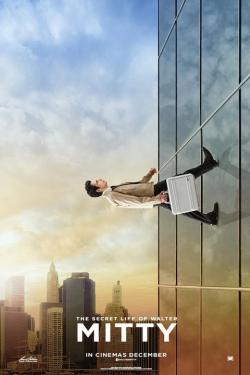
THE SECRET LIFE OF WALTER MITTY
US, 2013, 112 minutes, Colour.
Ben Stiller, Kristin Wiig, Shirley Mac Laine, Kathryn Hahn, Sean Penn, Adam Scott.
Directed by Ben Stiller.
Ben Stiller.
Ben Stiller has been making an impact on cinema screens and on television screens for several decades. He can write. He can direct. And he can be a striking screen presence, sometimes hilarious, sometimes more serious, and in The Secret Life of Walter Mitty, something of both.
In his early 30s, he chose to make, both directing and acting, the absurdly funny Zoolander. Zoolander was a supremely self-confident of award-winning nincompoop of a male model, coming from a disapproving mining family, vain, ignorant, but, finally, something of a movie hero. That was then, this is now. In his early 40s, he has decided to re-create James Thurber’s comic character, Walter Mitty. The short story by Thurber is readily available on the Internet, only two pages long, published in early 1939 – with a comic and musical version starring Danny Kaye in 1947.
Is a 1930s Walter Mitty relevant to the 21st century? In a period when men are supposed to be men (with more than a macho touch), is there room for a comic hero who is alarmingly introverted, satisfied on the surface with his 16 year basement but important job in framing and editing the photos for Life Magazine, unable to make real contact to find a girlfriend? And there is also his mother and sister, Shirley MacLaine? enjoying herself as his mother, Kathryn Hahn as his eccentric sister.
A man is expected to be sure of his identity and go about using it and developing it. Although, come to think of it, there is a whole generation of introverted game-players, assuming all kinds of identities instead of their own – is there a Walter Mitty computer game?
At the opening, Walter is unable to send a ‘wink’ to an attractive girl at work. He phones the computer dating company and begins a series of conversations, often at the most inopportune times and unlikely places, with the editor of the site, finally meeting him when he makes one of those times opportune instead of inopportune (funny silhouette version of an airport search). And then he goes into ‘the zone’, those imaginary spaces and places which Thurber introduced in his short story and which filmmakers and writers have taken much, much further. Walter is a hero, he rescues dogs, his photo is on the cover of Life Magazine, and , then, he is stranded on the subway station having missed his train.
Matters get complicated at Life Magazine, an executive (Adam Scott) being sent in to close the print magazine and put it on-line. This executive is a monster of a person, ruthless in his self-satisfaction and in his downsizing the staff. Needless to say, he is not impressed by Walter Mitty at all (though Walter does get the better of him in fights in the elevator and skateboarding along New York streets, in his imagination, of course). Then there is Cheryl (Kristin Wiig), new at Life Magazine, with a young son and an ex-husband, who begins a touch compassionately for Walter eventually attracted to him.
And that is only the opening. The Mitty adventures really begin, in real life, when Walter flies to Greenland to try to make contact with Life’s staff photographer, an interesting cameo by Sean Penn. There are some funny sequences with a big, burley, inebriated, singing helicopter pilot who takes Walter out to the ship, dropping him in the sea for him to be picked up rather than landing on the small ship. No luck in Greenland, trying out in Iceland where there are lots of mod cons but an erupting volcano. So a few Mitty real-life adventures.
Just when we think that this is a climax, Walter’s mother tells him that she has met the photographer and he has gone to Afghanistan to film snow leopard’s. What else is Walter to do but go there – the aim to find the perfect photo for the last cover and meet the deadline. Actually, what follows, in the Himalayas, are some rather nice emotional touches care of Sean Penn, and the resolution of the problem so laid-back that you might not notice, care of Shirley Mac Laine.
Walter’s imaginings are entertaining, with some funny episodes, though the film is not a long laugh-aloud to fun-fest. Rather it is a somewhat romantic, comic and serious exploration of a man in mid-life crisis who has not really faced his early-life crises. Good luck to Ben Stiller.
1. The story by James Thurber? The film with Danny Kaye? The film of the 1940s? A re-interpretation from 2013? Issues of fantasy, reality, identity?
2. Ben Stiller, his career, his work as actor, writer, start? Is screen presence? Genial and gentle here? More than a touch of the romantic?
3. The blend of fantasy and reality, the opening at the railway station, he is trying to send the Link, the fantasy and the dive, the rescue of the dog, the explosion, Cheryl and her gratitude? His being in the zone? The phone call about the website? This sequence of establishing his character and the audience accepting it?
4. New York City, the cityscapes, Manhattan, the offices, streets, skating rink, parts parks, skateboards, apartments? The atmospheric score?
5. The scenes in Greenland, the town, the isolation, the inn, the ship, small, the bunks and caverns? Iceland, the roads, the hotels, the eruption? The contrast with Afghanistan, the Himalayas, the high mountain peaks? More exotic?
6. Ben Stiller’s portrait of Walter Mitty, male, in his 40s, his work of 16 years, hidden, his partner at work, shy and awkward, talking to the manager of the dating website, his not having a proper profile, not enough activity? His being satisfied with Winks? At work, the new boss, his role to bring out the last issue of Life Magazine in print? In the elevator, the nasty encounter, Walter being in the zone and confronting the man, flowing through Manhattan, digging up the roads? The skateboards, the fights? Cheryl and his relationship, in reality, imagining him saving her in the ice? Misinterpreting her, talking, giving her the job to track down Sean’s address? In his office, downstairs in the dark, the photos, his 16 years of editing the photos, the missing picture, 25? Meeting Cheryl and her son, the skateboard, his imagining his heroics with her? The slinging off of the boss with Major Tom? The photo, searching everywhere, his assistant? The deadlines, the meetings, the mockery? His being humiliated? Going to visit his mother, his birthday, his sister with the cake, the issue of the piano, seeing it being transferred across the buildings, his mother and her concern about his going into the zone? His memories, the photos, working at Papa Johns, his father, the diary with nothing in it?
7. The decision to search for Sean, flying to Greenland, in the bar, the information, the big pilot and his singing and drinking, his decision to go with the pilot? Imagining Cheryl and her guitar, singing Major Tom, encouraging him to go into the helicopter, his jump? His having to dive into the sea, the shark and its menace, losing the radio parts? The rescue, on the boat, the sympathetic captain, the sympathetic pro-American in the cabin?
8. In Iceland, urged to take the bicycle, riding the roads, finding Papa Johns in Iceland, the motel, the boy’s not speaking English, bargaining for the skateboard? The man warning him to leave, his going on the skate board, the eruption, the man coming to rescue him, the escape? Coming home, his mother, the irony of Sean visiting her, the codes? The gift of the wallet, the words, his being touched? Disappointment, throwing away the wallet?
9. Going to Afghanistan, the trek, the heights, the sherpas, their hitting him with blessing? The difficulty and freezing, finding Sean, photographing the Snow leopards, the photo being in the wallet, playing soccer, returning home? The comedy piece of his being examined by the customs for his flute, his treatment? The editor of the website knowing who he was, getting him out, having the coffee together? His mother, casually giving him the wallet, the photo and not looking at it? Asserting himself about the magazine? Collecting his severance pay, seeing Cheryl, having left the skateboard to her son and thinking the repair man was her husband? The truth? Seeing the photo on the cover of Life Magazine – and Sean’s tribute to him and his work?
10. Cheryl, her story, different jobs, the son, the skateboard, the ex-husband, in Walter’s imagination, being rescued, encouraging him? Walking with him, the cover, the happy ending? Her son, the video message and thanks for the skateboard? The prospects of a happy family?
11. The manager of the transition, his pomposity, retrenching people, lack of feelings, his speeches, the issue of the quintessence and his not knowing the meaning? His mocking Walter? His assistants? The imagined fights, his being a comics-strip villain?
12. Walter’s assistant, their friendship, working together, trying to find the photo?
13. The editor of the website, the phone calls at all the different locations, the humour, Walter building up his profile, Cheryl on the website, Walter wanting his profile to be taken off? Needing the editor to identify him, their coffee, the encouragement?
14. His sister, her husband, the gift of the piano, knowing that Walter went into the zone? The meetings with Walter and his sister? Sean, coming to meet her, the comments and tributes? The wallet, perceiving it?
15. The people in Iceland, at the bar, the pilot? In Iceland, the boys and the skateboard, the man taking him from the eruption, the men in the boat?
16. Sean, top photographer, Sean Penn in the role, his story, if elusive, visiting Walter’s mother, the gift of the wallet, the niceness of the photo concealed in it? The filming of the snow leopards, his contemplation?
17. Contemporary story, the American male, self-confidence, lacking it? Retrenchments in the Internet age, magazines going online, publications being executed? And Walter Mitty discovering real life?
Published in Movie Reviews
Published in
Movie Reviews
Tagged under
Saturday, 18 September 2021 19:48
All Our Desires/ Tous nos envies
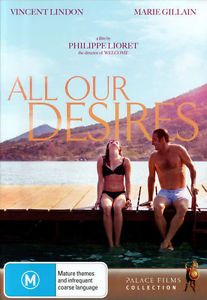
ALL OUR DESIRES/ TOUTES NOS ENVIES
France, 2011, 100 minutes, Colour.
Vincent Lindon, Marie Gillain.
Directed by Philippe Lioret.
All Our Desires is a very moving French film, directed by Philippe Lioret, director of the very strong film about migrants and refugees from Iraq in the camps on the English Channel, Welcome.
This is the story of a judge who has a terminal illness. She is happily married but does not reveal the illness to her husband. In the court, she encounters a single mother who has suffered at the hands of her husband and is trying to bring up her children. She has been brought to court by loan companies with their extortionate rates. The judge has compassion on her and invites it into her own family. She also consults another judge about the issues. He gives her a pessimistic prognosis but nevertheless involves himself in the issues. Unwittingly, he becomes her driver to the hospital and shares, with her family, the last days of her life.
The film has strong social conscience, especially with financial institutions and their exploitation, trying to get decisions from the European Court. But is also very moving film about illness, dealing with illness, and the judge providing for her family after she has died.
1. A humane story, French in tone, universal application? Social situations? The director and his interest in French social issues?
2. Provincial France, the towns, homes, the courts, school? Realism? The musical score?
3. The title, aspirations?
4. Claire and Chris, their children, home life, their love, the children at school, Clare giving Celine in the money for the trip, her returning it? Sleepovers for the children?
5. The surprised to find Claire as a judge, Celine’s surprise, Celine and her case, her husband leaving her, her bringing up her child, the loans, the small print in the contracts? Her having no money? The lawyer standing for the company, a hard stance? The interest on the loans, Celine unable to pay, the judges in the law, Claire and her emotional decision?
6. Celine and her gratitude? Going to the house, who care for the children, her own home, being small, the issues of paying rent, electricity, getting more debt? The huge interest rate? Are moving in with Claire and Chris and the children, who work in the house, is seeking the jobs?
7. The case being turned down, Clare invited to be interviewed by her supervisor, is criticism of her decision, involvement? Her being put off the case?
8. The getting advice about a judge, meeting Stephane, is office, the cup of coffee, the discussion, issues of the law, his pessimism, the details, Clare leaving upset?
9. Stephane, his coaching the rugby league, he’s enjoying it, is explaining it to Claire? His home life, his wife? Is ideas of justice, taking up the case, Celine going into the court, the plea? His winning? The victory overturned? The issue of appeals and Supreme Court? The issues of going to stress Borg and the European Court?
10. Claire, going to the hospital, the diagnosis, the short life expectation, her not wanting chemotherapy or radiotherapy, not telling Chris? Her fainting, her health, continually covering up her lapses?
11. Stephane and is ideas, plans, strategies, the issue of justice to persons or consideration of harm to the system and market values? Making a case, the judge accepting it?
12. Chris, devoted husband, skill as a cook, the visits and his meals, his plans, accepted by the restaurant?
13. Stephane and his driving clear to see her mother, please visit to her sister and the arguments, the background to her family life, going to the doctor? The impulse of going to the swim, her collapsing, the hospital thinking Stephane was her father? His signing her hot?
14. Her collapse, Chris unhappy with Stephane, the visits, her going out and enjoying the rugby union match? Her being unconscious, Stephane telling her that the case had been one, the movement of her fingers?
15. The growing illness, sitting outside of the children’s visit, Chris and his concern, her death?
16. The aftermath, actually winning the case, the consequences?
17. The human story, illness and resilience? Planning to the consequences of death – Celine with Chris and their caring for the family? The social concern, the victims of loan companies and high rates of interest? These themes well combined?
Published in Movie Reviews
Published in
Movie Reviews
Tagged under